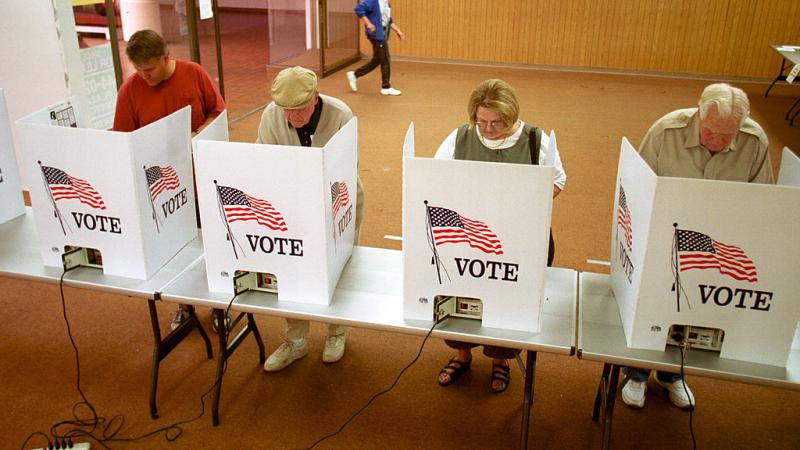AI program flags possible voter registration errors, aims to be used for voter roll maintenance
EagleAI NETwork can be used by states, counties, and citizens to analyze voter registrations.
A new artificial intelligence program that finds voter registration errors can be used for voter roll maintenance, possibly being a replacement for the Electronic Registration Information Center (ERIC).
Since last year, nine GOP-led states have left ERIC, a multistate voter data-sharing organization that facilitates voter registration and maintenance of voter rolls, amid such concerns as partisan influence, increasing costs and a failure to address voter fraud.
ERIC calls itself "the most effective tool available to help election officials maintain more accurate voter rolls and detect possible illegal voting."
The organization’s executive director, Shane Hamlin, wrote in a March 2 open letter on ERIC's website, "We are a member-run, member-driven organization. State election officials — our members — govern ERIC and fund our day-to-day operations through payment of annual dues, which they set for themselves."
States that have left ERIC, such as Texas and Virginia, are seeking an alternative to the organization that would aid in the maintenance of voter rolls.
A new alternative to ERIC is EagleAI NETwork, which is software that flags voter registrations that appear to have issues. These problematic registrations can then be reviewed by election officials to help in the maintenance of voter rolls.
Dr. Rick Richards, EagleAI NETwork CEO and president, told Just the News on Monday that the software “could do the job that ERIC is supposed to be doing, and much more.”
He explained that the software found 507 registered voters over 114 years old in Fulton County, Ga. After a Fulton County resident challenged those voter registrations, the number dropped to 37 registered voters over 114 years old.
Fulton County Department of Registration and Elections Director Nadine Williams told Just the News that the registrations had incorrect birthdates.
“Voter roll maintenance identified a birthdate data entry error,” Williams said. “No voters have been removed from the voter rolls due to this error. The data entry error is currently being corrected.”
EagleAI NETwork can be used by states, counties, and citizens to analyze voter registrations, according to a fact sheet for the software. While states and counties can use the software to maintain their voter rolls, citizens can use it to challenge registrations or point out clerical errors on the voter rolls.
“Citizens are not charged to use EagleAI NETwork but need to purchase a software license for it to work,” Richards explained. “Having all on the same software, looking at the same data, at the same time creates the transparency necessary to restore everyone’s faith in this part of the election process.”
EagleAI NETwork has been in testing for several months and will be launched in Georgia in September, he explained.
The software can be used to identify duplicate voter registrations, registrations of deceased voters, voters who have moved, registrations that are incomplete, registrations with nonresidential addresses, felons who don’t meet the eligibility requirements to vote, voters who have been adjudged mentally incompetent, and non-citizens, according to the fact sheet.
EagleAI NETwork doesn’t search for or include party affiliation of voter registrations, Richards said. The software uses publicly available data — such as USPS’ National Change of Address system, Private Change of Address sources, and the Social Security Administration’s Death Master File — but Richards said that if counties and states provide personally identifiable information, then the software could be more efficient in validating problem registrations.
Richards presented EagleAI NETwork to officials in the Georgia secretary of state’s office and Columbia County’s Board of Elections. He is also looking to expand its use to Florida, Nevada, North Carolina, and Texas, and is talking with people in 23 states.
Columbia County Board of Elections told Just the News on Wednesday that they “had discussions with Dr. Richards and participated in a couple of demonstrations of the Eagle AI program,” but "have not entered into an agreement. We did encourage Dr. Richards to have a public demonstration and invite local parties and organizations so that they can see for themselves what it is.”
Georgia secretary of state Elections Director Blake Evans said in a statement regarding EagleAI, "My thoughts are that the Eagle AI presentations that I have seen are confused and seem to steer counties towards unlawful list maintenance activities. Instead of asking questions or being curious about the data, EagleAI draws inaccurate conclusions and then spreads them as if they are facts."
Richards told Just the News that “Evans has only seen one presentation of a few of EagleAI screens and functions.
“EagleAI NETwork has made no suggestions to any counties regarding how they make decisions regarding voter roll maintenance,” Richards added. “EagleAI NETwork has offered a tool to improve the efficiency and accuracy of that process. EagleAI NETwork draws no conclusions, it only presents data to the county employees who have that responsibility and authority. In states that allow voter registration challenges from citizens, EagleAI NETwork can import the challenges and quickly return the results for the county election officials to review and make decisions.”
Evans also said that EagleAI NETwork claims Georgia has “105% turnout,” adding, “They include inactive records in their calculations, which is why the percentage is above 100%. Inactive records are records that have been captured in a lawful list maintenance process. Federal law says that a record must remain in inactive status for 2 General Elections before it can be canceled, unless the voter requests to be removed from the roll or the registrar receives evidence that the voter has died.”
Richards responded that “EagleAI NETwork didn’t claim there was 105% turnout in Georgia, but instead, reported 105% of Georgia’s Voting Eligible Population (VEP) was registered, which is true, and of course this includes both active and inactive registrants.”















